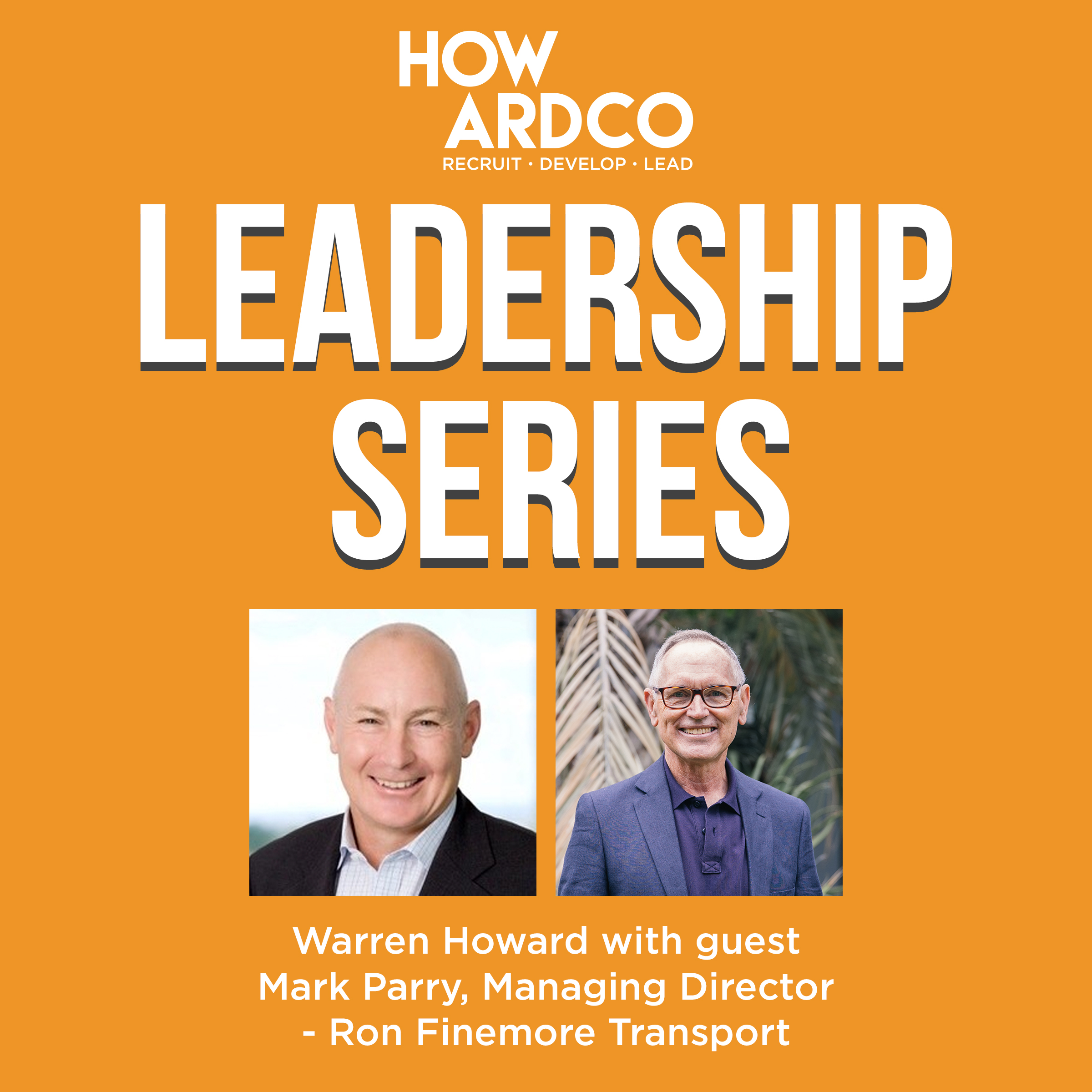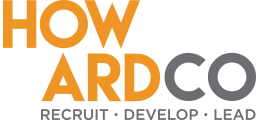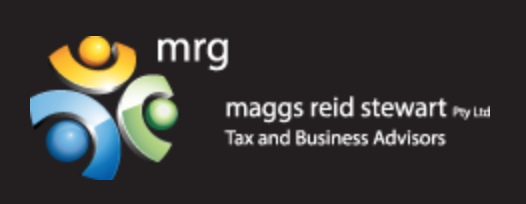Episode 4 Howardco with Mark Parry
Subscribe for FREE to listen in your favourite podcast app

Warren:
Hello, I’m Warren Howard. And today I’m joined with Mark Parry, who is the managing director of Ron Finemore Transport. For those of you who don’t know, Ron Finemore Transport is one of Australia’s largest regional transport organizations. If you’ve ever traveled up and down the Hume highway, you will have no doubt noticed the Ron Finemore trucks, the red livery Mercedes, or the Volvos, with the Ron Finemore transport brand on the side. Mark has been managing director for over five years now, and I’ve known mark for all of that time. Outside of work, Mark likes to cycle. He is certainly involved in exercise and keeping himself fit. Apart from that, he likes to chase the big barramundi, when he has time, up in the fishing waters of Northern territory. So welcome, Mark.
Mark:
Thank you Warren, and thank you for that introduction. Yes. It’s always fun to do things outside of work. And I think that makes sure that you’ve got the energy to do the things you need to do inside of work.
Warren:
Wonderful. And look, it is great to have you to talk to here about the topic of leadership. As I said, I’ve known you for five and a half years now. We’ve worked very closely together you and I, on a a number of projects and assignments within your business. I’ve got to see you in action. I know there’s a great story to tell, and I wanted to use this opportunity for us to share some of those experiences through your eyes to learn a little bit more about your particular approach to leadership and how you’ve applied it in your role at Ron Fenimore transport. So before we dive into the questions, I thought I’d just ask you to give us a little bit more background about yourself, Mark. You haven’t always worked in the transport industry. What’s the journey that’s brought you to where you are now?
Mark:
I did most of my high school and university in Woolongong and that’s important because it was a steel town. And when I was going through high school, BHP in its own right is still a big company today, obviously. But, it was very big in Woollongong in terms of the stewards, so that made me believe that I wanted to work in the steel industry without necessarily knowing what that meant at the time. So out of high school I did start a traineeship with BHP was doing a technical certificate at that stage in metallurgy. I certainly wanting to continue to build my career through BHP. There’s lots of opportunities in the company like that. That took me to places like Geelong and Wyalla and Newcastle and eventually Jakarta and other things. But part of that early journey, I had somebody who had made it to a superintendent level, which when you starting as a young person almost seems like God, who didn’t have a degree and said to me, you know, if you’re going to continue to get on in life, you need to have a degree. So consequently I did a degree, a business degree, be comm, in management, industrial relations, which to me was very much about people and how to lead. And then that led to various jobs.
Mark:
I ended up at Ron Finemore transport, purely by chance. I’d been working overseas in Indonesia, that role and position didn’t pan out as I expected, I and I found my self back in Australia with very little notice after 48 hours and particularly without a job. After helping do some consulting in different areas like sports medicine believe it or not, I saw the job advertised, and as you said, it’s a regional transport provider, it’s food and fuels. I didn’t know at that time, but the brand had a very strong reputation. And, you know, you were instrumental bringing me into company. Five and a half years later here we are. So I often say your early training and development doesn’t necessarily preclude you or stop you from working in any business. It’s up to you, what you do with the study, what you do with your experience and how you choose to use it.
Warren:
Thank you Mark, very much. So let’s launch into the questions. The first one is what three words best describe your leadership experience of the last 15 months.
Mark:
Exciting, Challenging, and I think as a result of those first two, probably Motivating.
Warren:
So they’re quite energizing words, Mark, and a lot of people might be thinking, what world was that guy living in? We’ve just been through possibly one of the most disrupted periods in most people’s working careers, which has been obviously highly challenging. Can you just explain a little bit more about your perspective on that and why you chose those three words?
Mark:
Yeah. I think firstly think about our company’s food and fuel. And if one thing has happened during the early COVID stages, more people were at home, they couldn’t eat out as a result of that. They had to shop for food more. There were episodes of panic buying, and that meant that more goods had to be moved from the distribution centers into the supermarkets. It did create a whole lot of different challenges internally because we also had to manage our people. Think about permits for drivers driving across borders. Think about the fact that we’re situated right on the border of New South Wales and Victoria where technically one side of the border was locked from the other at various times. We had to lift capacity in a time where most people were at home and we had to manage certain people being at home because like most places, we couldn’t have too many people in the office.
Mark:
You had no option, but to embrace those things. Our values are very much around safety and reliability, and in that instance, that was about getting goods to the customers. At some times the whole day got turned upside down because of the border restrictions, goods that might typically came from one location to go to a set of supermarkets were coming from a different location to go to a completely different set of supermarket. So it was constant change, which as I said, is exciting and challenging. And then because you have no option, but to embrace that, that then becomes a motivation about how you can make sure that you can keep people safe and deliver to your customers.
Warren:
Well, Mark, that explains exactly why I’m talking to you today. Just because of your perspective, your wider perspective on leadership, regardless of the situation and the circumstances. So thank you for that answer. So, just speaking more generally then, do you think people’s attitudes towards what they expect from their leaders is any different in 2021 as a result of our experiences of the last year?
Mark:
Yes and no Warren. And I say that because I was reflecting, you said, we’ve been through this major change and difficult circumstances. And for a lot of younger people, there’s never been a recession, there’s been continued growth over many decades and they’ve been able to get jobs relatively easily. And there’s certainly been very little uncertainty that our parents would have seen over their generation. Certainly, working through my career, you know, seeing recession’s, the global financial crisis and a range of other things. So the heart of leadership for me, is always about making sure that you can create simplicity in the other side of complexity for people. So giving them a message, or a set of things that they need to do that they can understand. Particularly during COVID in particular, but would have been the same in the GFC or recessions before that, trying to give people a sense of purpose, trying to ensure that they don’t feel overwhelmed, and ensuring that they have the resources and the support that they need to do their job.
Warren:
So Mark, thank you. What about your own experience as you were progressing in your career, as you described earlier, what did you learn about leadership on your own journey and perhaps what have been some of the influences on your current style of leadership that you’ve collected along the way?
Mark:
The first thing is you’ve got to embrace change. And what I mean by that is, I could still be living in Wollongong, probably not running a job as senior as this, probably not with an experience in a workplace that is as enriching as I have, but that means you’ve got to embrace change. You’ve got yo be prepared to move. You got to be prepared to do something that you haven’t done before, because every time you get a new role or a new position , could still be within BHP for instance, but it could be manufacturing, it could be steel making, could be mining, a whole range of things. If you’re not prepared to embrace that change yourself it’s very hard to continue to develop as a leader. I think the next thing then is look at each of those challenges and challenges as an opportunity to learn and stretch yourself. And to the extent that people say leadership or management can be lonely, I think the more senior you are in an organization that can be true, but in the early part of your career, however, there are always people who are prepared to offer advice. And I think the trap when you were younger is you think that it’s an impost on people to ask them for that help, now as people get on in their career, they’re always willing to help and provide some wisdom or knowledge.
Warren:
Very true, very, very good advice. Now, as I said, I’ve got to work with you quite a lot, mark in the last five and a half years, I know you have a personal mantra and I’ll replay it to you. You like to talk about having a leader full organization rather than a leader lead organization. Now, for those who are listening, can you explain a bit about what you mean by that? What do you mean between the difference between a leader-full organization, and a leader-led organization.
Mark:
I believe you’ve got to ensure people are clear on what they need to do; their objectives, their key job goals, their overall reason for being. Ensure that they have the resources and the accountability to do that. But apart from supporting them, get out of your way, what I find in a leader led organization, quite often, you have a person, a manager, or a senior executive that believes they should be responsible and control everything. And that tends to hold people back at the very least. But at the worst, that senior person becomes the bottleneck for all decision-making, and indeed sees themselves as the creator of all wisdom and knowledge in the business. And the collective will always do better than the individual. You then get to the next level where they will bring people into a room and ask people for their ideas, but they’ll still maintain control and ownership for all of that, and ultimately decide the way forward. Now, that’s better than not having people in the room, but it’s nowhere near as empowering, as engaging people in a conversation, getting them to bring forward their ideas, but then involving them very deeply in the, how that’s going to be achieved and indeed giving them ownership and accountability to do it. That can be frightening for some individuals to begin with. They might be early in their career or have not worked for someone like that before, and you need to trust, but verify at all stages. With those people, you might be offering support, but for a leader who is young and entering into that space, it’s also frightening because you don’t always know exactly what’s going on. You might only be seeing outcomes and results, not necessarily ‘what’ is happening and ‘how’ at a particular point in time. But, that again, is very motivating because you then create an organization that can exist without you, and you and I have had conversations at various times in the true measure of leader full is when you leave a business be it on holidays, or you’ve got a promotion and you’ve moved to a completely different site – How does that business run, how do those people operate? And if you’ve done that in the right way, and sustainably, people will continue to flourish, continue to grow and give the next leader the opportunity to take that next step. If the organization tends to come to a stop or it starts to decay, then you haven’t yet had the time to develop in full that leader full organization.
Warren:
Thank you, Mark. Now you started with a very positive message. Looking into the future, what inspires you most for both your business and your team, when you’re looking at 21, 22 and beyond.
Mark:
I was telling you a couple of things this morning, how humans are programmed, almost from a very young age, to avoid or reject change at a micro level, whether that’s going to school for the first time, whether that’s moving, all those sorts of things. At a macro level, humans have a wonderful ability to adapt and evolve and make the challenges that are ahead of them. Technology will continue to provide significant opportunities in our business, whether that’s semi autonomous vehicles, whether that’s machine learning to harvest a lot of the data we have to give us information, whether it’s giving people the opportunity to manage by exception, because things that are going well, they’re not getting a signal about, but they’re getting a very clear signal that the things that they need to pay attention to. Over the next two to three years, we will adapt and evolve to the COVID world that it is today. We’ll understand how we’re going to open up our borders in a way that’s less risky. We’ll be more comfortable with the world that is probably more inflationary than its been for some time. But I do think overall people will continue to adapt. That in there leads to the motivating part. The leaders job is to give people an understanding of the why that’s necessary and being much more involved, and engaged in the what and the how. So I think the next couple of years in particular leaders at all levels need to be spending more time listening to their people, giving them messages that resonates to them in a language or a style that they understand and spend a lot more time on the why, so you give them freedom to be involved in the how and the what, because they understand the why. So I’m very positive about the next couple of years for that reason, even though it will probably look different and feel different for many younger people than they’ve seen in the past. We will endure, and we will survive and we will continue to prosper.
Warren:
Thank you, Mark. One final question. I’d like you to think that you’re speaking now to people who perhaps for the first time have taken on a senior management role in their career. Perhaps it’s a general manager role, perhaps it’s a CEO, but this is a step for them, an advancement, but a first time in that role. What advice would you give to someone who’s stepping into that, you know, that C-suite, or that senior management space for the first time, about how to go about developing their own career and their own leadership style?
Mark:
Well, firstly, you’ve got to have confidence in yourself. You have been selected most likely through a process that’s involved internal and external candidates. So you’re there because you’re successful and you’re there because a group of people, be that a chairman, or a board, or a management group, believe you’re suitable for the job. So first off, be confident. The second thing is, youll always be surrounded by people who can make a huge contribution to the organization and to help you be successful. And for me, leadership is not about succeeding yourself, it’s about watching others succeed and delivering the outcomes that motivate them. So be confident, trust your people, understand their particular strengths and areas that you might need to focus on and get to know them in a way that allows you to engage deeply with them in a one-on-one or a group process or surrounding, in a way that resonates with them. Because if you can do that and together, I believe you’ll get some significant outcomes.
Warren:
Mark Perry, thank you so much for sharing your thoughts, your experience, wisdom and your positive enthusiasm. For, for what I know is a very big role in a very important organization. And on behind behalf of everyone, we do want to take our hat off to the transport/logistics industry, like the one that you lead, for the role that you’ve played in making sure that even during lockdown, you know, those supermarket shelves were filled. There was fuel for the cars, and life was able to keep going, in somewhat different, but at least slightly normal form. So well done to everyone who works in your organization. And thank you again for your time and sharing your thoughts with us.
Mark:
Thank you, Warren. And it has been a team effort and we’ll continue to ensure that we are successful and I appreciate your time.
slot gacor
togel online
slot88
slot gacor
slot gacor
slot gacor
situs togel
slot online
demo slot
situs toto
slot gacor
bandar togel
slot thailand
situs toto
bento4d
slot thailand
toto togel
toto togel
link alternatif bento4d





















